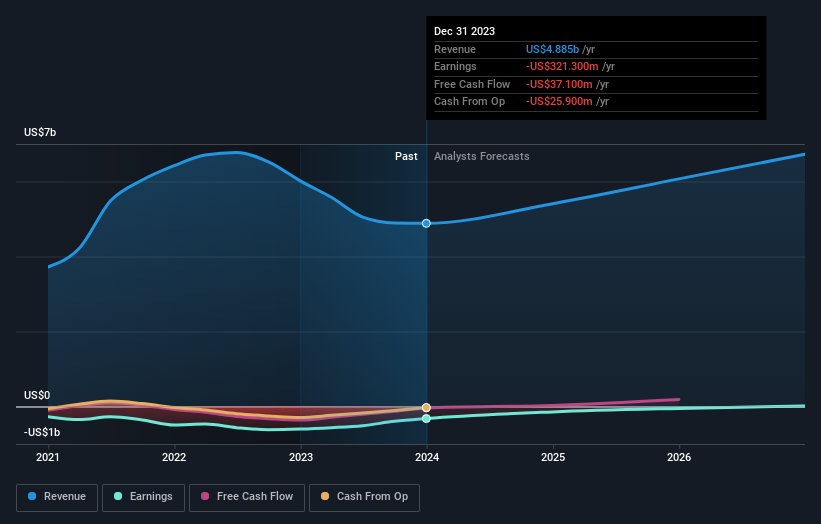- United States
- /
- Real Estate
- /
- NYSE:COMP
Compass, Inc. (NYSE:COMP) Released Earnings Last Week And Analysts Lifted Their Price Target To US$3.87
It's been a pretty great week for Compass, Inc. (NYSE:COMP) shareholders, with its shares surging 16% to US$3.85 in the week since its latest annual results. Revenues came in at US$4.9b, in line with forecasts and the company reported a statutory loss of US$0.69 per share, roughly in line with expectations. The analysts typically update their forecasts at each earnings report, and we can judge from their estimates whether their view of the company has changed or if there are any new concerns to be aware of. We thought readers would find it interesting to see the analysts latest (statutory) post-earnings forecasts for next year.
View our latest analysis for Compass

Taking into account the latest results, the current consensus from Compass' seven analysts is for revenues of US$5.41b in 2024. This would reflect a meaningful 11% increase on its revenue over the past 12 months. Losses are predicted to fall substantially, shrinking 60% to US$0.26. Yet prior to the latest earnings, the analysts had been forecasting revenues of US$5.31b and losses of US$0.30 per share in 2024. Although the revenue estimates have not really changed Compass'future looks a little different to the past, with a cut to the loss per share forecasts in particular.
These new estimates led to the consensus price target rising 8.7% to US$3.87, with lower forecast losses suggesting things could be looking up for Compass. It could also be instructive to look at the range of analyst estimates, to evaluate how different the outlier opinions are from the mean. The most optimistic Compass analyst has a price target of US$6.00 per share, while the most pessimistic values it at US$2.50. Note the wide gap in analyst price targets? This implies to us that there is a fairly broad range of possible scenarios for the underlying business.
Of course, another way to look at these forecasts is to place them into context against the industry itself. It's pretty clear that there is an expectation that Compass' revenue growth will slow down substantially, with revenues to the end of 2024 expected to display 11% growth on an annualised basis. This is compared to a historical growth rate of 16% over the past five years. Compare this to the 112 other companies in this industry with analyst coverage, which are forecast to grow their revenue at 11% per year. So it's pretty clear that, while Compass' revenue growth is expected to slow, it's expected to grow roughly in line with the industry.
The Bottom Line
The most important thing to take away is that the analysts reconfirmed their loss per share estimates for next year. They also reconfirmed their revenue estimates, with the company predicted to grow at about the same rate as the wider industry. We note an upgrade to the price target, suggesting that the analysts believes the intrinsic value of the business is likely to improve over time.
Keeping that in mind, we still think that the longer term trajectory of the business is much more important for investors to consider. At Simply Wall St, we have a full range of analyst estimates for Compass going out to 2026, and you can see them free on our platform here..
Don't forget that there may still be risks. For instance, we've identified 1 warning sign for Compass that you should be aware of.
The New Payments ETF Is Live on NASDAQ:
Money is moving to real-time rails, and a newly listed ETF now gives investors direct exposure. Fast settlement. Institutional custody. Simple access.
Explore how this launch could reshape portfolios
Sponsored ContentNew: AI Stock Screener & Alerts
Our new AI Stock Screener scans the market every day to uncover opportunities.
• Dividend Powerhouses (3%+ Yield)
• Undervalued Small Caps with Insider Buying
• High growth Tech and AI Companies
Or build your own from over 50 metrics.
Have feedback on this article? Concerned about the content? Get in touch with us directly. Alternatively, email editorial-team (at) simplywallst.com.
This article by Simply Wall St is general in nature. We provide commentary based on historical data and analyst forecasts only using an unbiased methodology and our articles are not intended to be financial advice. It does not constitute a recommendation to buy or sell any stock, and does not take account of your objectives, or your financial situation. We aim to bring you long-term focused analysis driven by fundamental data. Note that our analysis may not factor in the latest price-sensitive company announcements or qualitative material. Simply Wall St has no position in any stocks mentioned.
About NYSE:COMP
Fair value with moderate growth potential.
Similar Companies
Market Insights
Weekly Picks

THE KINGDOM OF BROWN GOODS: WHY MGPI IS BEING CRUSHED BY INVENTORY & PRIMED FOR RESURRECTION


Why Vertical Aerospace (NYSE: EVTL) is Worth Possibly Over 13x its Current Price


The Quiet Giant That Became AI’s Power Grid
Recently Updated Narratives

Butler National (Buks) outperforms.


A tech powerhouse quietly powering the world’s AI infrastructure.


Keppel DC REIT (SGX: AJBU) is a resilient gem in the data center space.
Popular Narratives


MicroVision will explode future revenue by 380.37% with a vision towards success


Crazy Undervalued 42 Baggers Silver Play (Active & Running Mine)





